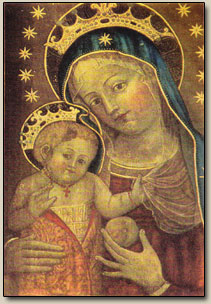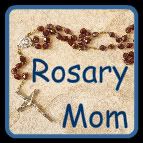I recently finished reading a book by Marcus Grodi,
How Firm a Foundation. If you know Marcus Grodi then you know he is a former Protestant Minister who converted to Catholicism and now hosts
The Journey Home show on EWTN. (Which I love!) Each week he has a different guest who converted to Catholicism or fallen away Catholics who've come home to the church.
Mr. Grodi wrote this fiction book even though I wondered if part of it tells his life story. He claims in the author's afterword that his book is based loosely on his life and a compilation of stories from people he has met through his journey. It is fictitious though but extremely thought provoking. The story is about Reverend Stephen LaPointe who loves Jesus, is married with children, and is a Congregationalist ordained minister who believes the bible is sufficient to practice and preach his faith. From my understanding, Congregational Churches are structured so that each congregation independently and autonomously runs its own affairs. Therein lies his problem.
Reverend Stephen LaPointe struggles throughout this story on little things such as, should he wear a clerical collar? a suit and tie? And then on to bigger issues of faith such as divorce, abortion, sin, and being led by the Holy Spirit. The demands placed on him by his church often take priority over his family life and his marriage suffers for it. He does not have authority over his church... the elders do and he battles them about what he believes is the word of God. He has to worry about offending the biggest donors of his divided church... some believe that once saved, always saved and they don't want to hear about sin or repentance, heaven and hell are myths. Others believe that yes, Jesus died for our sins but there is still the reality of heaven and hell. Instead of being able to talk authoritatively on these matters, Reverend LaPointe asks for time to discern this matter so he can put off offending his parishioners.
He jumps from church to church seeking a Congregational Church that is in sync with what he believes and will understand
his need to be a husband to his wife and a father to his boys. He is pulled in so many directions and inside turmoils with "how can the bible alone be a trustworthy foundation of truth if so many sincere believers come up with such defensible yet contradictory opinions from the same text? And all of them saying they are being guided by the Holy Spirit?"
All of his soul searching leads him to study the Early Church Fathers and he realizes that the early church did not have the bible. They were taught from oral sacred tradition and what the Early Church Fathers taught was NOT what he learned in seminary nor spent 20 plus years of his life preaching in the different churches. One such reading came from St. Irenaeus (who lived from 140 to 202 AD) who was the second bishop of Lyons in what is now France. He was converted by St. Polycarp who had been a disciple of the Apostle John. He said this,
"The church having received this preaching and this faith, although she is disseminated throughout the whole world, yet guarded it, as if she occupied but one house. She likewise believes these things just as if she had but one soul and one and the same heart; and harmoniously she proclaims them and teaches them and hands them down, as if she possessed but one mouth. For, while the languages of the world are diverse, nevertheless, the authority of the tradition is one and the same.
Neither do the Churches among the Germans believe otherwise or have another tradition, nor do those among the Iberians, nor among the Celts, nor away in the East, nor in Egypt, nor in Libya, nor those which have been established in the central regions of the world. But just as the sun, that creature of God, is one and the same throughout the whole world, so also the preaching of the truth shines everywhere and enlightens all men who desire to a knowledge of truth.
Nor will any of the rulers in the Churches, whatever his power of eloquence, teach otherwise, for no one is above the teacher; nor will he who is weak in speaking detract from the tradition. For the faith is one and the same, and cannot be amplified by one who is able to say much about it, nor can it be diminished by one who can say but little."
The above quote came from St. Irenaeus' book
Against Heresies.
Then Vincent of Lerins wrote the book,
Commonitorium before he died in 450 A.D., "Keep that which is committed. What is committed? It is that which has been entrusted to you, not that which you have invented; what you have received, not what you have devised; not a matter of ingenuity, but of doctrine; not of private acquisition, but of public tradition; a matter brought to you, not created by you; a matter you are not the author of, but the keeper of; not the teacher, but the learner; not the leader, but the follower.
This deposit guard. Preserve the talent of the Catholic Church unviolated and unimpaired. What has been entrusted to you may remain with you and may be handed down by you. You received gold; hand it down as gold."
Vincent of Lerins wrote the book
Commonitorium in which he gave arguments on how the Christian Faith was to be preserved and protected against the onslaught of heresies. This above quote is in relation to Paul's command to Timothy to "keep that which is committed to your trust, avoiding the profane novelties of words."
I don't want to ruin the end of the book for anyone who may be interested in reading it, but as I said earlier, it's very thought provoking and informative. Marcus Grodi wrote an engrossing and yet hopeful book.
http://www.aquinasandmore.com/catholic-books/How-Firm-A-Foundation/sku/1699
noreen














































.jpg)
















